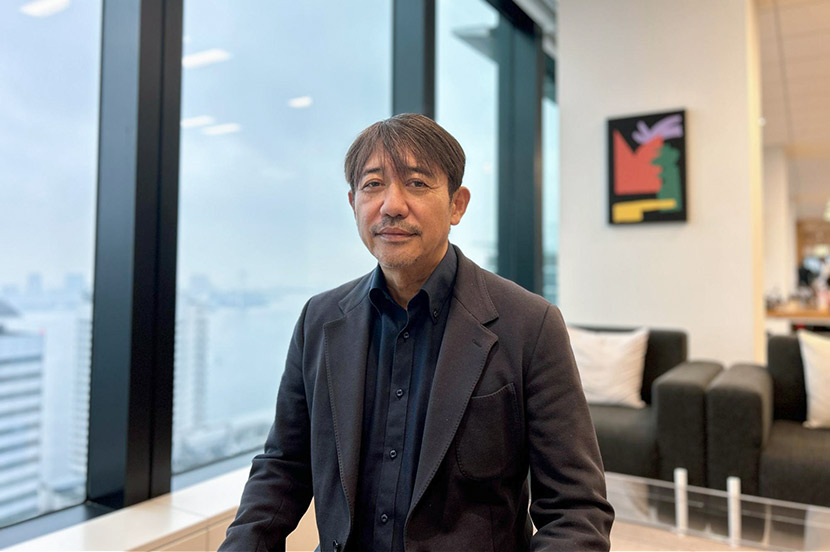
The Republic of Rwanda has mandated the use of information and communication technology (ICT) to accelerate its socio-economic development, and has already made significant progress in integrating it into its society. One symbol of the country’s progress and aspirations is its 500 francs banknote, which shows three students using computers for their studies. Despite these advancements, however, over 40% of schools in Rwanda still lack Internet connectivity. Challenges such as insufficient teacher staff numbers and qualifications also persist in the educational sector. To address these issues, Rwanda's Ministry of Education (MINEDUC) is collaborating with SoftBank Corp. (TOKYO: 9434) to implement an educational technology (EdTech) initiative that utilizes non-terrestrial networks.
Designed and proposed by SoftBank in line with MINEDUC's efforts to promote and enhance digital education, the EdTech project combines digital educational content with high-quality satellite-based Internet broadband connectivity and related local management.
Building environments for learning in hard-to-reach areas
Located about an hour's drive from Rwanda’s capital city Kigali is a school in the rural community of Matyazo. In addition to communication infrastructure challenges, schools in rural areas like Matyazo lack an adequate water supply, and are faced with frequent power outages and poor road infrastructure.


In environments like these, non-terrestrial networks (NTN)–wireless communication systems that operate above the Earth's surface–can play a constructive role.
SoftBank employees working on its Rwanda EdTech project, which includes the community of Matyazo, have been working to install rooftop antennas so satellite-based communications can be utilized to enable Internet access and create a learning environment for children. SoftBank News spoke to SoftBank’s project members to learn more.
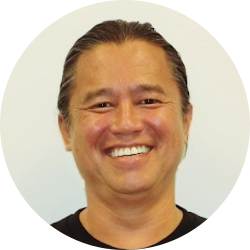
Takuya Fukui
NTN Strategy Department, Global Communication Division
Product Technology Division, Technology Unit, SoftBank Corp.
Fukui is responsible for managing and promoting the EdTech project. He has over 25 years of experience in global businesses, including relations with carriers outside Japan and selling backbone infrastructure for over-the-top (OTT) digital content distribution, and his career includes a stint at SoftBank's New York office.
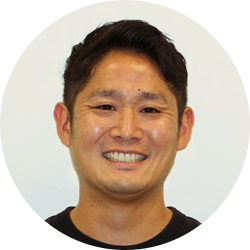
Toru Taguchi
NTN Strategy Department, Global Communication Division
Product Technology Division, Technology Unit, SoftBank Corp.
Taguchi serves as a Project Management Officer (PMO) for the EdTech project. Taguchi was motivated to join the project due to his desire to engage in business with Africa, which stemmed from a study abroad experience in Tanzania during his university years, as well as an internship related to well-drilling (borehole drilling) technology support.
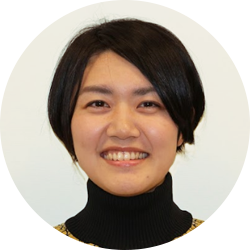
Yuki Umehara
NTN Strategy Department, Global Communication Division
Product Technology Division, Technology Unit, SoftBank Corp.
Umehara joined the EdTech project in October 2023, three years after joining SoftBank. She was Inspired to join SoftBank and engage in business in Africa following an internship with a dairy farming project in Uganda, during which she was a veterinary student.
Delivering educational opportunities through ICT
Umehara: To mitigate the teacher and skill shortage, Cyber University, a group company of SoftBank Group Corp., is providing its "Cloud Campus" e-learning platform. Cloud Campus makes it possible to comprehensively manage curriculum creation and monitor learning progress histories. It also facilitates the creation of educational materials, which is being done in collaboration with private high school teachers in Rwanda who are certified in educational syllabus creation. The schools are equipped with tablets, which allows teachers to use pre-downloaded digital materials to teach mathematics, physics, English, computer science and other subjects.
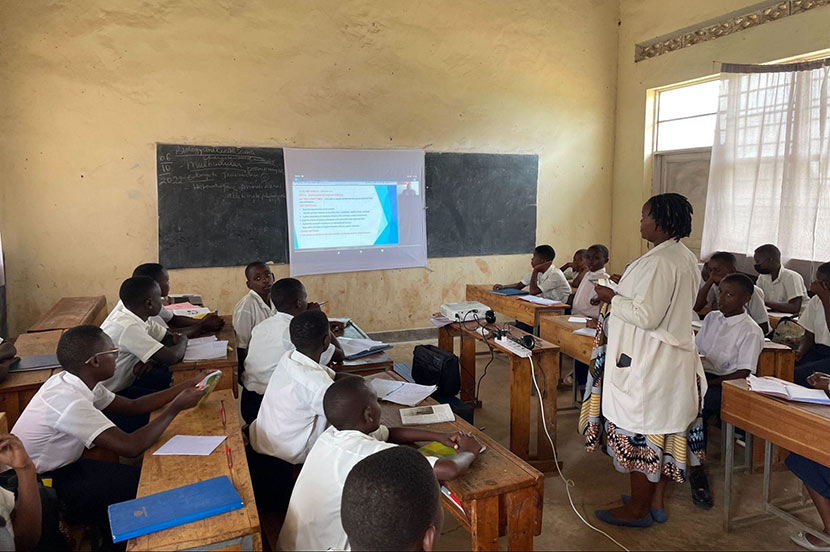
Taguchi: Teachers at the schools that have adopted this platform have expressed their enthusiasm for incorporating Internet-enabled videos and images into their lessons to enhance student understanding and engagement. With the technology already implemented in 20 schools across Rwanda, the initiative is receiving positive feedback, with many saying it is making classes more comprehensible and appealing for students.

Modem equipment for satellite communication services installed at a school

A Wi-Fi access point
Taguchi: Some schools were equipped with satellite antennas for Internet access in the past, but have failed to utilize the service continuously, leaving the infrastructure unused. Our EdTech project is designed to be self-sustaining by training local partners and teachers on tablet use and the Cloud Campus platform, and by providing ongoing support through regular calls and visits. By listening to feedback from the field, the team strives to make the technology user-friendly and effective for both teachers and students to ensure its ongoing relevance in Rwanda’s education system.
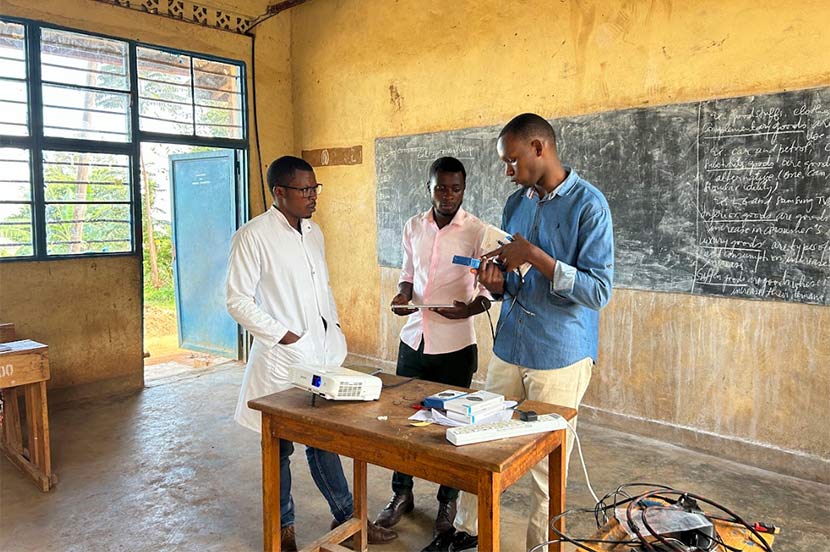
The goal beyond Internet access
Fukui: We offer a comprehensive package that includes Internet access through satellite communications and educational content to provide equal educational opportunities to children living in regions where there are information disparities.

An antenna installed on a rooftop receives satellite signals 36,000km away
Fukui: Installing a satellite antenna to pick up signals from a geostationary orbit (GEO) satellite 36,000 km away requires a lot of experience. The slightest misalignment of the antenna can impede signal reception, and this can often interfere with progress. To address this, we focus on motivating the teams working onsite.
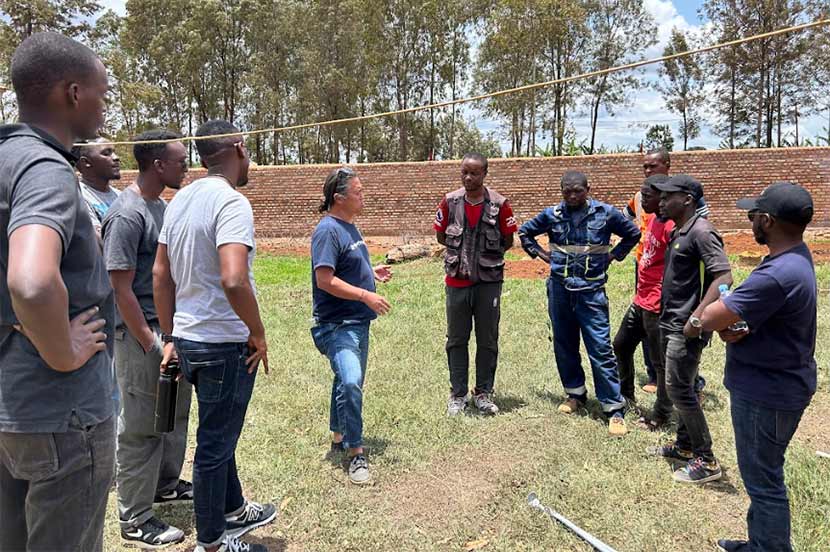
Fukui interacting with local partners while installing a satellite antenna
Taguchi: When I asked high school students about their future dreams, many responded with words of despair, citing the lack of electricity and financial resources as barriers to their futures. This strengthened our resolve to not only enhance education through our business activities but also to help bring about a world where they can dream and strive toward their dreams.
It's crucial to explain carefully that the introduction of digital devices is not about taking away teachers' jobs, but rather about improving education in Rwanda. Working closely together with teachers is the key to our approach.

Taguchi engaging with children in Rwanda
Umehara: By leveraging telecommunications technology, we aim to deliver high-quality education equally to all children, and we hope this initiative will serve as a catalyst for growth in other African nations. Our aim with this project, SoftBank's first venture into Africa, is to create a successful model in collaboration with MINEDUC and local schools, and to expand this model across the continent.
Related news
(Posted on March 12, 2024)
by SoftBank News Editors
